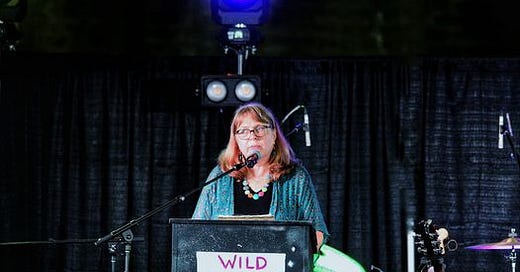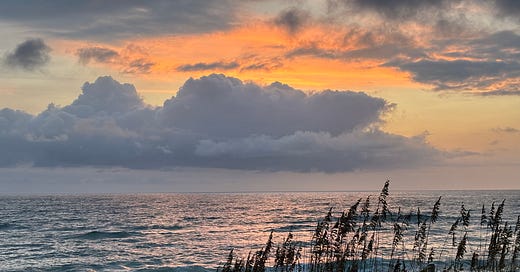
Discover more from The Cottage
Today is the First Sunday of Advent.
Advent at the Cottage this year centers on justice and joy. Yeah, I know. Justice is under threat and joy is scarce right about now.
But we’re going to help one another find traces of both this December.
Make sure to scroll through today’s post for the schedule and details of this week’s online Advent retreat.
During December, paid subscribers will be treated to an online Advent retreat and a daily Advent calendar with a plethora of special surprise guests.
To become a paid subscriber, or give a gift of The Cottage, click on the button below for a seasonal discount of 10% off of the yearly rate.
If you’d like to be part of the Advent series and can’t afford a paid subscription, just drop us a note. We’ve never refused a complimentary subscription to anyone with a legitimate need. The Cottage email is: the.cottage.email@gmail.com
Jeremiah 33:14-16
The days are surely coming, says the Lord, when I will fulfill the promise I made to the house of Israel and the house of Judah. In those days and at that time I will cause a righteous Branch to spring up for David; and he shall execute justice and righteousness in the land. In those days Judah will be saved and Jerusalem will live in safety. And this is the name by which it will be called: "The Lord is our righteousness."
1 Thessalonians 3:9-13
How can we thank God enough for you in return for all the joy that we feel before our God because of you? Night and day we pray most earnestly that we may see you face to face and restore whatever is lacking in your faith.
Now may our God and Father himself and our Lord Jesus direct our way to you. And may the Lord make you increase and abound in love for one another and for all, just as we abound in love for you. And may he so strengthen your hearts in holiness that you may be blameless before our God and Father at the coming of our Lord Jesus with all his saints.
Luke 21:25-36
Jesus said, "There will be signs in the sun, the moon, and the stars, and on the earth distress among nations confused by the roaring of the sea and the waves. People will faint from fear and foreboding of what is coming upon the world, for the powers of the heavens will be shaken. Then they will see 'the Son of Man coming in a cloud' with power and great glory. Now when these things begin to take place, stand up and raise your heads, because your redemption is drawing near."
Then he told them a parable: "Look at the fig tree and all the trees; as soon as they sprout leaves you can see for yourselves and know that summer is already near. So also, when you see these things taking place, you know that the kingdom of God is near. Truly I tell you, this generation will not pass away until all things have taken place. Heaven and earth will pass away, but my words will not pass away.
"Be on guard so that your hearts are not weighed down with dissipation and drunkenness and the worries of this life, and that day catch you unexpectedly, like a trap. For it will come upon all who live on the face of the whole earth. Be alert at all times, praying that you may have the strength to escape all these things that will take place, and to stand before the Son of Man."
Last summer, I was thinking ahead toward this December and looked up the lectionary readings for this Advent. At the beach. On vacation. Months ago.
At that time, the Harris campaign had just begun. And, much to the surprise of some, the early campaign and the Democratic convention were marked by joy. But keen observers knew that Harris was drawing off an old strategy of working for justice — linking political change to joy. The twinning of the two is the foundation of African-American resilience and resistance; justice and joy were central to the success of the Civil Rights movement in the 1960s.
In other words, justice and joy were on my mind when I read the biblical passages for this Advent. I saw something I’d not seen before. It was striking how often both words appeared in the texts, creating an interplay between the promise of justice with the experience of joy.
Why had I never noticed that Advent was a season of both justice and joy? Of course, I was always aware of judgment in Advent’s apocalyptic themes. And it is impossible to ignore joy in these weeks. But putting them together in a single seasonal spiritual fabric?
That seems hard. At least for a middle-age white woman like me. I needed to reimagine Advent with justice and joy at the center. The summer insight and its spiritual challenge have been hard to shake.
It is easy to misunderstand the words “justice” and “joy.”
Justice is not vindictiveness or revenge, even though it does mean vindication. In general, justice means uprightness, equity, and fairness. In the Bible, justice refers to the making right of all things. It is a relational term about living rightly with others and with creation. This Advent, we might think of justice as a the vindication of God’s dream for humanity, the desire that all of creation may live in dignity, safety, and peace. The shorthand traditional term for that dream is the “Kingdom of God” or, in more contemporary parlance, God’s commonwealth.
Joy is not happiness, even though the two are related. Joy is delight, gladness, and pleasure — a deep inner wellspring of contentment and comfort. It is a disposition, an outlook, and maybe even a purposeful practice. Happiness is what we feel in relation to external conditions; joy is experienced regardless of circumstances. A wise maxim says, “We pursue happiness, we choose joy.”
Neither justice nor joy are easy. Indeed, they can be elusive. We need new eyes to see them, renewed hearts to experience them, and willing hands to act on them in the world.
Find a place inside where there's joy, and the joy will burn out the pain.
— Joseph Campbell
Advent opens with three readings — an apocalyptic text from Luke (the gospel for this lectionary year), a promise from Jeremiah that God’s justice is coming, and a passage on joy from 1 Thessalonians.
Jeremiah and Luke are obviously complementary texts. Both address the “day” when the Kingdom of God arrives in fullness — when justice and righteousness will be known here and now. These texts are in the tradition of prophetic apocalypticism, revealing the mysteries of the coming “Day of the Lord.”
But the reading from 1 Thessalonians seems oddly cobbled in between the other two, as Paul almost bursts with joy expressing his feelings about his friends in Thessalonica.
What’s joy got to do with apocalypse?
Indeed, the root word χαρ (char) for joy — χαρᾷ (chara) in Greek — appears THREE times in verse 3:9:
How can we thank (εὐχαριστίαν — char in the root) God enough for you in return for all the joy (χαρᾷ — chara) that we rejoice (χαίρομεν — chairomen) before our God because of you?
That’s a lot of joy. Indeed, the first three chapters of 1 Thessalonians nearly explodes with joy and thanks (a related word). In its pages, Paul is anything but dour and scolding. He is warm and inspirational, likening his ministry among the Thessalonians to that of a nurse caring for her own children. Yes, that Paul — using a maternal metaphor to describe being an apostle. 1 Thessalonians is the oldest book in the New Testament, the first of Paul’s letters, and written long before any of the four gospels. It may have been written before 48 CE, only fifteen years after Jesus’ crucifixion.
And that’s important. Not only because the letter is a beautiful expression of joy. But because in it Paul speaks to a pressing theological concern in this brand-new Christian community. What are these first disciples worried about?
These new followers are worried that, in those fifteen or so years between Jesus’ death and Paul’s ministry, some of their number have died before the kingdom has fully arrived. After all, Jesus hasn’t come back yet — like he promised when he went up to God. Fifteen years is a long time to wait. They are fearful that their late brothers and sisters have missed the promised day of God’s justice. Some of them were tempted to give up. Certainly, some had fallen into despair.
Their fear of things not going as they expected, complete with losing hope in the promise of the Kingdom, is the concern behind Paul’s letter.
Thus, for three and half chapters, Paul goes on about joy and thanksgiving, about maternal care and God’s steady promises, about faith and hope. In the fourth chapter, he speaks directly to the “day” (the same day of Jeremiah and Luke) when God’s reign of justice will be established. He believes that it will happen suddenly, “like a thief in the night.” Those who follow Jesus need to be alert to its coming, as “children of light.”
Paul trusted that his answer would strengthen the resolve of this little community and renew their hope. Their loved ones wouldn’t miss a thing, he insisted. The grace and power of God has raised Jesus and would raise their beloveds to new life in the Kingdom as well. You can trust that God’s promise of justice will be fulfilled. For everyone. And so: Rejoice!
However, he might not have explained himself very well. He was pretty new to this epistle writing thing. He does engage in a few flights of fancy trying to explain himself. And there are some tangled paragraphs about the coming of the Kingdom.
Christians have long argued about what 1 Thessalonians means. But since the mid-19th century, these verses in Thessalonians have been ripped out of context and foolishly turned into a made-up doctrine of the Rapture — a theological mistake that has done little other than discredit the Christian faith. This interpretation of the coming of the Kingdom is so widespread that it is nearly impossible to escape its grip in many Protestant circles.
In this view, God’s justice is punishment. Jesus will return to rescue a few from the suffering that will attend the coming Kingdom. Everyone else will be punished by a vengeful God on “the day of the Lord.” Not knowing when this day will come morphed into an evangelical scare tactic to manipulate the hopeless and frightened to “accept Jesus as their Lord and Savior.” It is hard to think of a single good consequence of this doctrine in either the life of the church or in Christian ethics — ever.
But the whole context isn’t that. Paul’s somewhat theologically obtuse explanation of the “day of the Lord” takes up only two paragraphs in a five chapter epistle. The larger context is joy — Paul even says the details of how or when the Kingdom will come are irrelevant. What is important is to live a life of gratitude, marked with joy no matter the challenges, and manifested in love of God and neighbor.
The bigger point is to trust the promise of God. Even when that promise seems to be taking too long. Even when some have died awaiting its fulfillment. Instead of despair, we trust that the promise will be — and is being — fulfilled.
God can be trusted. That’s the source of consolation and wellspring of joy. Justice, the long awaited vindication of God’s dream, is sure. Justice and joy. That’s the essence of faith.
And yes, all of that is elusive. Justice eludes us. Joy seems a taunt. Yet, justice and joy were the first words of Paul. Indeed, this is the most ancient wisdom from the earliest followers of Jesus.
The oldest words are the first words of Advent.
Be on guard … so you do not despair … the day is at hand … restore whatever is lacking in your faith. There’s more afoot than we know. God promised.
INSPRIATION
Joy is the justice
we give ourselves.
It is Maya’s bird
sung free past the prison bars,
holding spirits bound —
without due process,
without just cause.
Joy is the steady running stream,
rights sprung up
from moss-soft ground —
under hanging trees,
nourished by blood,
grown through pain,
now seeping sweet,
equality’s demands made clear
from sea
to shining sea,
north to south,
west to east,
flyover heartland
in between…
Joy is the soul
underneath the journey,
gaze snagged on wonder,
not knowing final destination,
yet blessed as a witness,
moored to ground.
Joy is worshipful tears
dripped into grateful smile….
To my people,
to those fallen on hard times,
pierced by injustice,
torn asunder by hate,
know within the marrow bone
of your soul
that joy is the divine sublime in you.
Joy is for all the dangers,
all the toil,
every last one of the snares
already overcome,
and hopes yet to be born.
What I mean to say is that
joy is a song….
You see y’all? Joy is that leaky bucket that lets me sometimes carry half a song.
But what I intend for us,
our claim,
that
joy is the justice
we must give ourselves.
— J. Drew Lanham, “Joy is the Justice (We Give Ourselves)” excerpts from his longer poem that can be found at OnBeing. It’s a great poem and I recommend reading it in its entirety.
Joy, rather than happiness, is the goal of life, for joy is the emotion which accompanies our fulfilling our natures as human beings. It is based on the experience of one's identity as a being of worth and dignity.
— Rollo May
Give a gift of The Cottage at the special Advent rate. Honor your pastor, treat a friend, or surprise a family member with 12 months at The Cottage. A great early Christmas present — one that keeps giving all year!
Click on the button below. Then, look for the third “bubble” at the top of page and click on “Gift.” Then, follow the directions.
Joy is the simplest form of gratitude.
— Karl Barth
ONLINE ADVENT RETREAT
During this first week of Advent, three guests come to The Cottage to share their perspectives on “Justice and Joy.” Note the time differences on each day and mark your calendars. A few important details can be found below for your information.
Wednesday, December 4 at 12 noon (Eastern)/9:00 AM (Pacific): John Philip Newell, wisdom teacher of Celtic Christianity and author of multiple books on the same, will be with us to share Advent insights drawn from his new book, The Great Search.
Thursday, December 5 at 4:00 PM (Eastern)/1:00 PM (Pacific): Jemar Tisby, historian, author, and preacher, will offer reflections from African-American Christianity on the theme of justice and joy. His latest book is The Spirit of Justice.
Friday, December 6 at 1:00 PM (Eastern)/10:00 AM (Pacific): Noel Paul Stookey honestly doesn’t need an introduction because he is the well-known and well-loved singer-songwriter from the iconic folk trio Peter, Paul, and Mary. He’ll be gifting us with a few songs in a mini-concert. Currently, he’s sharing thoughts through his newsletter, Strings, along with his co-host, Jeanne Torrence Finley. Jeanne and Noel (who are both avid The Cottage readers!) have been working on his autobiography (publication date TBA), For the Love of It All: Music, Justice, and Faith Beyond Labels.
📣 Details, Details:
There is NO NEED FOR SEPARATE REGISTRATION. These online gatherings (with later access to the recordings) are part of your paid subscription.
ALL paid subscribers will AUTOMATICALLY RECEIVE A ZOOM LINK on December 4, 5, and 6 a few hours in advance of that day’s event. Each Zoom link will be unique to that day and you must use the link for the specific day.
You can attend live or watch later. ⭐️ EACH SESSION WILL BE RECORDED. ⭐️ The recordings will be sent out on the evening following the live session. I’ll also send out an email with all three on Saturday, December 7. You can view them anytime — and create your own Advent retreat.
If you aren’t currently part of the Cottage paid subscriber community, you can sign up here with a special rate that is ONLY AVAILABLE by clicking on the button below. On that click-through page, you’ll get subscription information and directions to sign-up (clicking is not a commitment — there’s more than one step!):
We need Joy as we need air.
We need Love as we need water.
We need each other as we need the earth we share.
— Maya Angelou
Finally, “Light One Candle,” a Peter, Paul & Mary song perfect for the First Sunday of Advent:
This Advent, don’t let your light go out.

















"Don't let the light go out. Let it shine through our love and our tears." What an appropriate song for now and for the coming years. May we show more love for our fellow travelers on this earth than we have seen recently and may we persevere through our tears----both personal abd communal.
Thank you Diana for ALL you give us to find Joy in Thanksgiving to God. I have a card and bookmark that says:
"JOY is the most infallible sign of the presence of God."
--Teilhard de Chardin